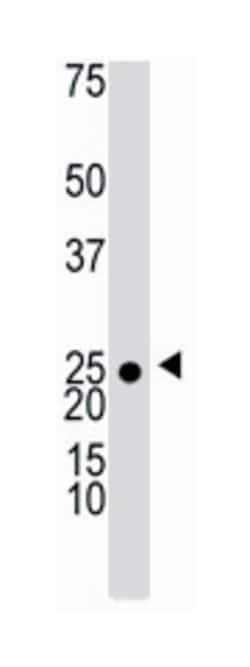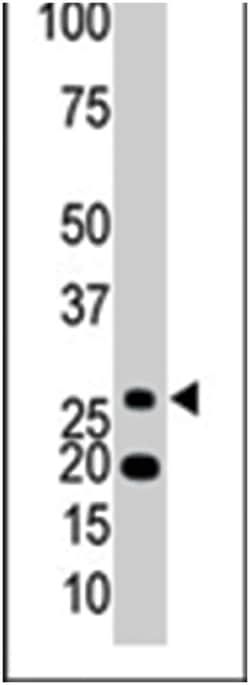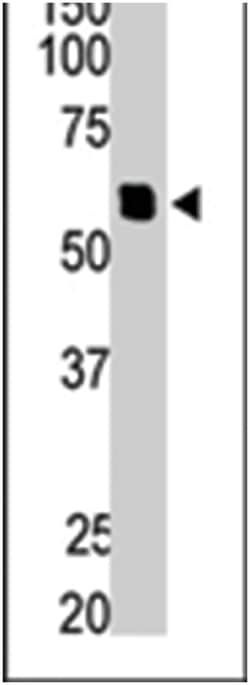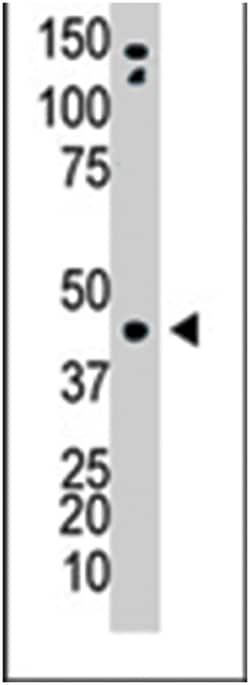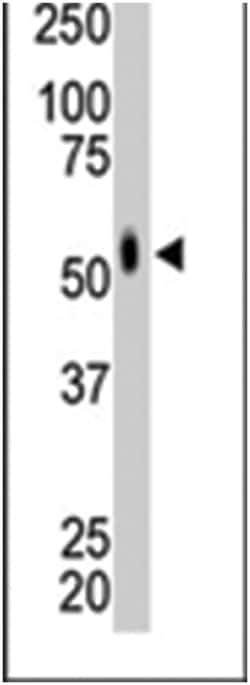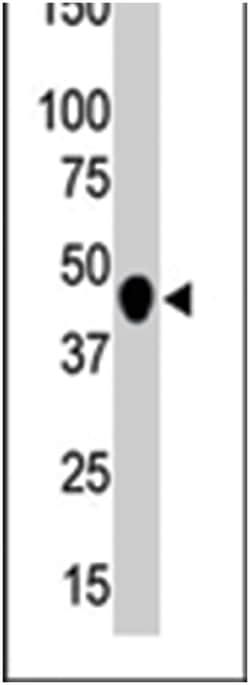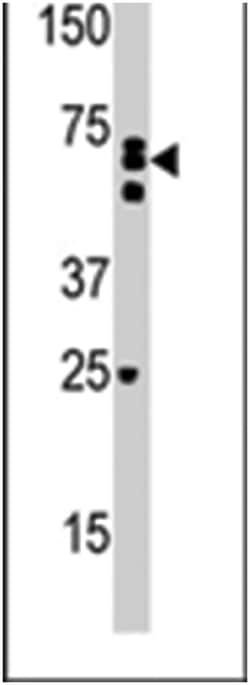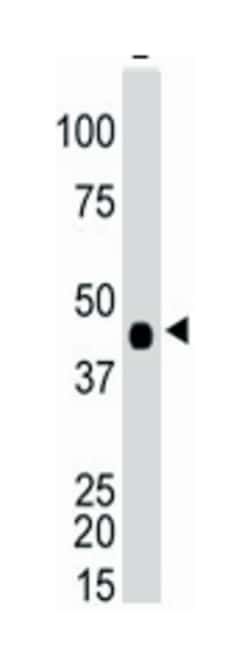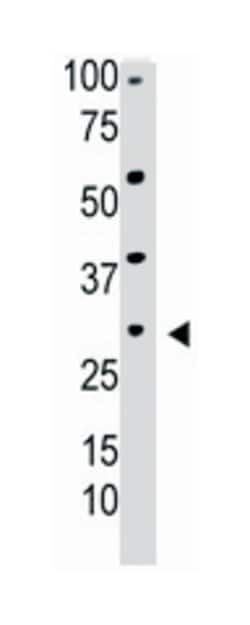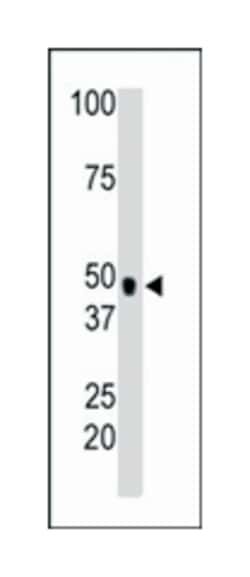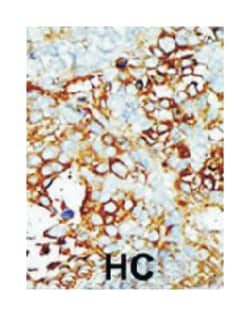89-131-486
TK2 Rabbit anti-Human, Mouse, Polyclonal Antibody, Abnova™
Manufacturer: Abnova Corporation
Select a Size
| Pack Size | SKU | Availability | Price |
|---|---|---|---|
| Each of 1 | 89-131-486-Each-of-1 | In Stock | ₹ 53,133.00 |
89-131-486 - Each of 1
In Stock
Quantity
1
Base Price: ₹ 53,133.00
GST (18%): ₹ 9,563.94
Total Price: ₹ 62,696.94
Antigen
TK2
Classification
Polyclonal
Description
Rabbit polyclonal antibody raised against synthetic peptide of TK2.
Formulation
In PBS (0.09% sodium azide)
Gene Symbols
TK2
Immunogen
A synthetic peptide (conjugated with KLH) corresponding to N-terminus of human TK2.
Quantity
400 μL
Primary or Secondary
Primary
Target Species
Human, Mouse
Form
Liquid
Applications
ELISA, Western Blot
Conjugate
Unconjugated
Dilution
ELISA (1:1000) Western Blot (1:100-500) The optimal working dilution should be determined by the end user.
Gene
TK2
Host Species
Rabbit
Purification Method
Protein G purification
Regulatory Status
RUO
Gene ID (Entrez)
7084
Content And Storage
Store at 4°C. For long term storage store at -20°C.Aliquot to avoid repeated freezing and thawing.
Description
- The mitochondrial deoxyribonucleotide (dNTP) pool is separated from the cytosolic pool because the mitochondria inner membrane is impermeable to charged molecules
- The mitochondrial pool is maintained by either import of cytosolic dNTPs through dedicated transporters or by salvaging deoxynucleosides within the mitochondria; apparently, enzymes of the de novo dNTP synthesis pathway are not present in the mitochondria
- In nonreplicating cells, where cytosolic dNTP synthesis is downregulated, mtDNA synthesis depends solely on the mitochondrial salvage pathway enzymes, the deoxyribonucleoside kinases
- Two of the 4 human deoxyribonucleoside kinases, deoxyguanosine kinase (DGK) and thymidine kinase-2, are expressed in mitochondria
- Human DGK, encoded by the DGUOK gene (MIM 601465), efficiently phosphorylates deoxyguanosine and deoxyadenosine, whereas TK2 phosphorylates deoxythymidine, deoxycytidine, and deoxyuridine
- Thymidine kinase-2 (TK2) is a deoxyribonucleoside kinase that phosphorylates thymidine, deoxycytidine, and deoxyuridine, and also phosphorylates antiviral and anticancer nucleoside analogs.[supplied by OMIM
Compare Similar Items
Show Difference
Antigen: TK2
Classification: Polyclonal
Description: Rabbit polyclonal antibody raised against synthetic peptide of TK2.
Formulation: In PBS (0.09% sodium azide)
Gene Symbols: TK2
Immunogen: A synthetic peptide (conjugated with KLH) corresponding to N-terminus of human TK2.
Quantity: 400 μL
Primary or Secondary: Primary
Target Species: Human, Mouse
Form: Liquid
Applications: ELISA, Western Blot
Conjugate: Unconjugated
Dilution: ELISA (1:1000) Western Blot (1:100-500) The optimal working dilution should be determined by the end user.
Gene: TK2
Host Species: Rabbit
Purification Method: Protein G purification
Regulatory Status: RUO
Gene ID (Entrez): 7084
Content And Storage: Store at 4°C. For long term storage store at -20°C.Aliquot to avoid repeated freezing and thawing.
Antigen:
TK2
Classification:
Polyclonal
Description:
Rabbit polyclonal antibody raised against synthetic peptide of TK2.
Formulation:
In PBS (0.09% sodium azide)
Gene Symbols:
TK2
Immunogen:
A synthetic peptide (conjugated with KLH) corresponding to N-terminus of human TK2.
Quantity:
400 μL
Primary or Secondary:
Primary
Target Species:
Human, Mouse
Form:
Liquid
Applications:
ELISA, Western Blot
Conjugate:
Unconjugated
Dilution:
ELISA (1:1000) Western Blot (1:100-500) The optimal working dilution should be determined by the end user.
Gene:
TK2
Host Species:
Rabbit
Purification Method:
Protein G purification
Regulatory Status:
RUO
Gene ID (Entrez):
7084
Content And Storage:
Store at 4°C. For long term storage store at -20°C.Aliquot to avoid repeated freezing and thawing.
Antigen: CHKA
Classification: Polyclonal
Description: Rabbit polyclonal antibody raised against synthetic peptide of CHKA.
Formulation: In PBS (0.09% sodium azide)
Gene Symbols: CHKA
Immunogen: A synthetic peptide (conjugated with KLH) corresponding to N-terminus of human CHKA.
Quantity: 400 μL
Primary or Secondary: Primary
Target Species: Human, Mouse
Form: Liquid
Applications: ELISA, Western Blot
Conjugate: Unconjugated
Dilution: ELISA (1:1000) Western Blot (1:100-500) The optimal working dilution should be determined by the end user.
Gene: CHKA
Host Species: Rabbit
Purification Method: Protein G purification
Regulatory Status: RUO
Gene ID (Entrez): 1119
Content And Storage: Store at 4°C. For long term storage store at -20°C.Aliquot to avoid repeated freezing and thawing.
Antigen:
CHKA
Classification:
Polyclonal
Description:
Rabbit polyclonal antibody raised against synthetic peptide of CHKA.
Formulation:
In PBS (0.09% sodium azide)
Gene Symbols:
CHKA
Immunogen:
A synthetic peptide (conjugated with KLH) corresponding to N-terminus of human CHKA.
Quantity:
400 μL
Primary or Secondary:
Primary
Target Species:
Human, Mouse
Form:
Liquid
Applications:
ELISA, Western Blot
Conjugate:
Unconjugated
Dilution:
ELISA (1:1000) Western Blot (1:100-500) The optimal working dilution should be determined by the end user.
Gene:
CHKA
Host Species:
Rabbit
Purification Method:
Protein G purification
Regulatory Status:
RUO
Gene ID (Entrez):
1119
Content And Storage:
Store at 4°C. For long term storage store at -20°C.Aliquot to avoid repeated freezing and thawing.
Antigen: MAP4K2
Classification: Polyclonal
Description: Rabbit polyclonal antibody raised against synthetic peptide of MAP4K2.
Formulation: In PBS (0.09% sodium azide)
Gene Symbols: MAP4K2
Immunogen: A synthetic peptide (conjugated with KLH) corresponding to internal region of human MAP4K2.
Quantity: 400 μL
Primary or Secondary: Primary
Target Species: Human, Mouse
Form: Liquid
Applications: ELISA, Immunohistochemistry (PFA fixed), Western Blot
Conjugate: Unconjugated
Dilution: ELISA (1:1000) Western Blot (1:100-500) Immunohistochemistry (1:50-100) The optimal working dilution should be determined by the end user.
Gene: MAP4K2
Host Species: Rabbit
Purification Method: Protein G purification
Regulatory Status: RUO
Gene ID (Entrez): 5871
Content And Storage: Store at 4°C. For long term storage store at -20°C.Aliquot to avoid repeated freezing and thawing.
Antigen:
MAP4K2
Classification:
Polyclonal
Description:
Rabbit polyclonal antibody raised against synthetic peptide of MAP4K2.
Formulation:
In PBS (0.09% sodium azide)
Gene Symbols:
MAP4K2
Immunogen:
A synthetic peptide (conjugated with KLH) corresponding to internal region of human MAP4K2.
Quantity:
400 μL
Primary or Secondary:
Primary
Target Species:
Human, Mouse
Form:
Liquid
Applications:
ELISA, Immunohistochemistry (PFA fixed), Western Blot
Conjugate:
Unconjugated
Dilution:
ELISA (1:1000) Western Blot (1:100-500) Immunohistochemistry (1:50-100) The optimal working dilution should be determined by the end user.
Gene:
MAP4K2
Host Species:
Rabbit
Purification Method:
Protein G purification
Regulatory Status:
RUO
Gene ID (Entrez):
5871
Content And Storage:
Store at 4°C. For long term storage store at -20°C.Aliquot to avoid repeated freezing and thawing.
Antigen: KHK
Classification: Polyclonal
Description: Rabbit polyclonal antibody raised against synthetic peptide of KHK.
Formulation: In PBS (0.09% sodium azide)
Gene Symbols: KHK
Immunogen: A synthetic peptide (conjugated with KLH) corresponding to N-terminus of human KHK.
Quantity: 400 μL
Primary or Secondary: Primary
Target Species: Human, Mouse
Form: Liquid
Applications: ELISA, Western Blot
Conjugate: Unconjugated
Dilution: ELISA (1:1000) Western Blot (1:100-500) The optimal working dilution should be determined by the end user.
Gene: KHK
Host Species: Rabbit
Purification Method: Protein G purification
Regulatory Status: RUO
Gene ID (Entrez): 3795
Content And Storage: Store at 4°C. For long term storage store at -20°C.Aliquot to avoid repeated freezing and thawing.
Antigen:
KHK
Classification:
Polyclonal
Description:
Rabbit polyclonal antibody raised against synthetic peptide of KHK.
Formulation:
In PBS (0.09% sodium azide)
Gene Symbols:
KHK
Immunogen:
A synthetic peptide (conjugated with KLH) corresponding to N-terminus of human KHK.
Quantity:
400 μL
Primary or Secondary:
Primary
Target Species:
Human, Mouse
Form:
Liquid
Applications:
ELISA, Western Blot
Conjugate:
Unconjugated
Dilution:
ELISA (1:1000) Western Blot (1:100-500) The optimal working dilution should be determined by the end user.
Gene:
KHK
Host Species:
Rabbit
Purification Method:
Protein G purification
Regulatory Status:
RUO
Gene ID (Entrez):
3795
Content And Storage:
Store at 4°C. For long term storage store at -20°C.Aliquot to avoid repeated freezing and thawing.
